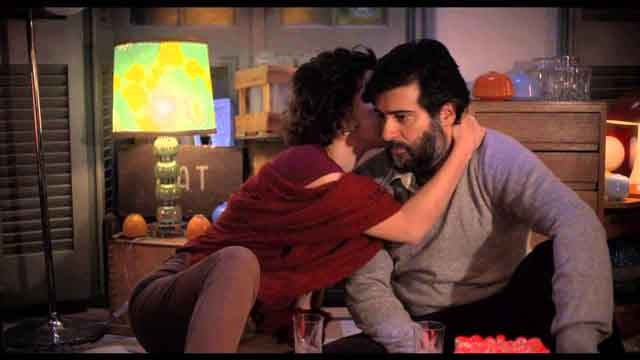 DOLORES FONZI AND RAFAEL SPREGELBURD IN EL CRITICOYou can't have everything
DOLORES FONZI AND RAFAEL SPREGELBURD IN EL CRITICOYou can't have everythingFilm critics aren't usually the protagonists of films. They just review them. They may not be too keen on reviewing a mocking depiction of themselves. So Argentinian director Hernán Guerschuny shows bravery and a certain wit in daring to make a powerful but oddball critic the central character of his movie,
El Crítico. Victor Tellez (Rafael Spregelburd) is a bearded, grumpy soul, the reviewer for an important Buenos Aires newspaper. After near daily sessions in a dingy screening room he and three colleagues gather for coffee and trash what they've seen, reserving their most dismissive remarks for romantic comedies. Tellez loathes them. But, as luck would have it, and as the action of
El Crítico unfolds, he himself will turn out to be stuck in his own rom-com. Guerschuny makes this device work using a style that's both knowing and accessible, referential and cute. Sentimental viewers get a wistful romance, while flm nerds are treated to an allusive meta-tale. The movie steers a narrow line between tongue-in-cheek and sweet, and maintains just enough of a balance of sophistication and accessiblity to make it work. In the cinema of exhausted ideas, cross off another one.
The picture of a film critic as a sullen boor won't flatter actual reviewers, but they may like being depicted as having a power to make or break a film only a few ever do. Tellez can't be taken too seriously: he's a stereotype to play with, just like the cliches of rom-com.
Tellez is a Francophile movie snob so gone on the the Nouvelle Vague he talks to himself continually in French. He suffers from "maladie du cinéma," he tells himself. His sixteen-year-old niece Agatha (Telma Crisanti), a video shop clerk and rom-com fan, finds those old black-and-white French films simply "out of date." His colleagues, including Schuster (Daniel Kargieman, in a baseball cap that makes him look like Michael Moore), provide him with a small, quiet, nerdy claque utterly supporting Tellez's assumption that most movies today are crap, totally predictable and only worthy of cinephile contempt. Tellez 's editor at the paper, on the other hand, is becoming uncomfortable with his reviews, aware that both the public and local movie executives are increasingly fed up with Tellez's caustic writing.
Tellez isn't just a critic. He's dodging an angry young filmmaker, Arce (Ignacio Rogers), who pursues and confronts him. And he's working on a script himself, for a boss with the cult-referential name of Gorodisch (Eduardo Iaccono). Tellez naturally knows a thing or two about plot lines, and can reel off all the cliches of rom-com in twenty seconds: the meet-cute, the offbeat first date, the first kiss with fireworks in the background, the tumultuous encounters in a heavy rain, the doubts, the reconciliation, the climax involving running and an airport. But all this is what, with tongue firmly in cheek, Guerschuny offers us for Tellez himself, with Sofia (Dolores Fonzi, the wife of Gael García Bernal), a charming, exotic, madcap and mysterious woman. She has the kind of odd accent that, in movies, Victor notes -- unable to tell life from films -- will justify an international co-production. Sofia, who turns out to be from Madrid and here only temporarily, has rom-com quirks. She's well off, but steals things. She has a pink bike helmet. Her clothes are offbeat but stylish. The meet-cute involves real estate. Sofia turns up just as Tellez has found the apartment of his dreams. It's big, airy, bright, old fashioned, very similar in feel, in fact, to the Paris flat in an Eric Rohmer movie. And she steals it away from him. He pursues her, not for herself, but for the apartment. Is this a love affair with a Spanish woman, or with a perfect apartment? As we learn housing costs are rising in Buenos Aires we wonder if this movie isn't more about real estate than romance. Isn't finding a perfect house like falling in love?
But Tellez does fall for Sofia. They have their first kiss, with the obligatory fireworks in the background. They make love at his place. She likes how he makes toast. Then she spots his jealous ex-girlfriend Roxana (Ana Katz) and gets turned off. Heavy rain, crashing into a movie set, script deliveries in a golf bag: the allusions, jokes, and original details multiply. Arce's plotting against Tellez turns the action in a thriller direction for a while. Tellez turns mushy. Now he's living in a rom-com, he starts to like them, and even, hilariously, weeps at one in a screening as his friends laugh and sneer. They assume his reviews are being rewritten by his editor. They forgive him: it's happened to everybody. His gushy platitude in a review of a sentimental movie, "Life is a journey with many opportunities" is quoted on a poster displayed everywhere in the city.
Some of the action, including events involving the niece and the angry filmmaker, seem merely plot filler, and as the movie goes into its last third it risks becoming as banal as the rom-coms it's been warning us about. But there are still good and funny moments and the movie references to spot keep on coming. (Rom-coms may be the easiest genre to copy and mock.
El Crítico leaves the others untouched.)
El Critico, Argentina, 90 mins., debuted 11 April 2013 at Buenos Aires International Festival of Independent Cinema. The film has a US theatrical release coming by Music Box. Watched on a screener for this review as part of the 2014 San Francisco Jewish Film Festival; and there are Jewish actors and references: Sofia, for instance tells Tellez she's attended kaddish for her father. SFJFF showings : Aug 2 (California Theater, Berkeley), Aug. 3 (Castro, San Francisco), Aug 9 (Smith Theater, San Rafael).
Music Box release Friday 15 May 2015.

July 24-August 10, 2014





